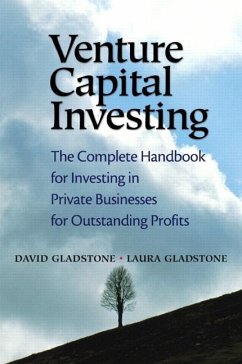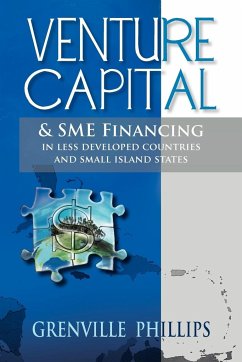Venture Capital Investing
The Complete Handbook for Investing in Private Businesses for Outstanding Profits
Venture Capital Investing
The Complete Handbook for Investing in Private Businesses for Outstanding Profits
- Broschiertes Buch
- Merkliste
- Auf die Merkliste
- Bewerten Bewerten
- Teilen
- Produkt teilen
- Produkterinnerung
- Produkterinnerung
In his classic bestseller Venture Capital Handbook, leading venture capitalist David Gladstone showed thousands of companies how to get funding and work with early stage investors. Now, in his revision of the classic, Venture Capital Investing, he looks at venture capital through the eyes of the investor. Gladstone shows all of you VC investors and angels exactly how to weed through scores of business proposals and find the gem that will deliver outstanding returns, especially in these soft economic times. You will learn what to look for in a business proposition; how to assess entrepreneurs…mehr
![Corporate Venture Capital Corporate Venture Capital]() Kevin McnallyCorporate Venture Capital72,99 €
Kevin McnallyCorporate Venture Capital72,99 €![Venture Capital (Routledge Revivals) Venture Capital (Routledge Revivals)]() Milford B GreenVenture Capital (Routledge Revivals)62,99 €
Milford B GreenVenture Capital (Routledge Revivals)62,99 €![The Venture Fund Blueprint The Venture Fund Blueprint]() Shea Tate-Di DonnaThe Venture Fund Blueprint29,99 €
Shea Tate-Di DonnaThe Venture Fund Blueprint29,99 €![Venture Capital Networks Venture Capital Networks]() Cristiano BellavitisVenture Capital Networks21,99 €
Cristiano BellavitisVenture Capital Networks21,99 €![Venture Capital in the Changing World of Entrepreneurship (PB) Venture Capital in the Changing World of Entrepreneurship (PB)]() Venture Capital in the Changing World of Entrepreneurship (PB)64,99 €
Venture Capital in the Changing World of Entrepreneurship (PB)64,99 €![Venture Capital & Sme Financing Venture Capital & Sme Financing]() Grenville PhillipsVenture Capital & Sme Financing30,99 €
Grenville PhillipsVenture Capital & Sme Financing30,99 €![Crossing Borders: A Venture Capitalist's Guide to Doing Business in Latin America Crossing Borders: A Venture Capitalist's Guide to Doing Business in Latin America]() Nathan LustigCrossing Borders: A Venture Capitalist's Guide to Doing Business in Latin America17,99 €
Nathan LustigCrossing Borders: A Venture Capitalist's Guide to Doing Business in Latin America17,99 €-
-
-
Hinweis: Dieser Artikel kann nur an eine deutsche Lieferadresse ausgeliefert werden.
- Produktdetails
- Verlag: Pearson Education
- Seitenzahl: 512
- Erscheinungstermin: 13. August 2003
- Englisch
- Abmessung: 232mm x 154mm x 30mm
- Gewicht: 711g
- ISBN-13: 9780131018853
- ISBN-10: 013101885X
- Artikelnr.: 21722980
- Herstellerkennzeichnung
- Libri GmbH
- Europaallee 1
- 36244 Bad Hersfeld
- 06621 890
- Verlag: Pearson Education
- Seitenzahl: 512
- Erscheinungstermin: 13. August 2003
- Englisch
- Abmessung: 232mm x 154mm x 30mm
- Gewicht: 711g
- ISBN-13: 9780131018853
- ISBN-10: 013101885X
- Artikelnr.: 21722980
- Herstellerkennzeichnung
- Libri GmbH
- Europaallee 1
- 36244 Bad Hersfeld
- 06621 890
1. Keys to Successful Investing.
What Are the Basic Items to Look for in a Business Proposition? It's Not an
Investment, It's a Partnership. Prepare a Written Summary before You Begin
to Invest. What Does A Summary Look Like? Some Words about Franchising.
Summary—Quick Standards of Venture Capital Investing.
2. Analysis of Management.
The Study of Entrepreneurs. Characteristics of Entrepreneurs. How We See
Entrepreneurs. Interviewing Entrepreneurs. Assessment of Entrepreneurs.
What Venture Capitalists Look for in Entrepreneurs. Characteristics of
Small Business Managers versus Entrepreneurs. Conclusions on Entrepreneurs.
Developing Background Information. Final Judgment.
3. Reviewing Personnel and Compensation.
How Is the Company Organized? How Are People Compensated? What Employment
Contracts Exist? What Is the Workforce Structure? What Personnel Records
Are Maintained? Major Strengths and Weaknesses.
4. Analysis of Marketing and Sales.
Who Are the People Who Market and Sell? What Are They Selling? Who Buys the
Product or Service? What Is Said to the Customer? What Is the Marketplace
for the Product or Service? How Is Price Determined? What Internal Reports
Are Made? What External Information Is Available? Basic Information. What
Are the Strengths and Weaknesses?
5. Investigating Production.
The Facility. Equipment. Production Capacity. Production Employees.
Regulatory Agencies. Subcontracting Work. Inventory. Quality Control.
Production Costs. Production Levels. Back to Capacity. Strengths and
Weaknesses of the Production Process. Purchasing Process. Receiving.
Shipping. Customer Service. Research and Development. Basic Information.
Conclusions about Production.
6. Analysis of the Financial Statements and Projections.
Personnel. Analysis of the Numbers. Budgeting and Control. Past Financings.
Use of Proceeds. Projections. Basic Information. Conclusions on the
Financial Area.
7. Reference Information.
Corporate Identification. Corporate Structure. Management Questions.
Professional References. Credit Information. Conclusions on Reference
Information.
8. Negotiating the Deal and Commitment Letter.
Pricing the Deal. Commitment Letters. An Investment Memorandum. Conclusions
about the Commitment Letter.
9. The Legal Closing.
First Type of Closing: Loan with Options. Second Type of Closing: Legal
Documents for the Purchase of Stock. Lawyers as Investors or Business
Owners. Experienced Lawyers Are Best. Procedures for Reviewing Documents.
Legal Fees Keep Going Up. How Lawyers Run up Your Legal Bill. The Closing:
A Moment of Truth. What to Remember About Lawyers. Documentation.
10. Monitoring the Investment.
Involvement. Major Policy Decisions. Monthly Reports. Board
Meetings/Investor Meetings. Other Discussion Items. Maintaining Good
Records. Warning Signs. Why Entrepreneurs Have Financial Problems. Why
Entrepreneurs Have People Problems. What to Do with Problems. Secret of a
Successful Relationship. Degree of Involvement by the Venture Capitalist.
Venture Capitalist Objectives.
11. The Exit.
Exit One: Going Public. Exit Two: Sale to a Strategic or Financial Buyer.
Exit Three: Sale Back to the Company. Exit Four: Sale to Another Investor.
Exit Five: Reorganizing the Company. Exit Six: Liquidation. When You Are in
a Workout. Save Your Investment.
12. Finding Good Investments.
Developing an Investment objective. Originating Investment Opportunities.
Proactivity. Handling Investment Opportunities. Using Brokers. Final Word.
Appendix A: Questions Used in Venture Capital Investigations.
Appendix B: Actual Documents.
Appendix C: List of Traits for Analysis of People.
Appendix D: Evaluation of an Entrepreneur by an Industrial Psychologist.
Index.
1. Keys to Successful Investing.
What Are the Basic Items to Look for in a Business Proposition? It's Not an
Investment, It's a Partnership. Prepare a Written Summary before You Begin
to Invest. What Does A Summary Look Like? Some Words about Franchising.
Summary—Quick Standards of Venture Capital Investing.
2. Analysis of Management.
The Study of Entrepreneurs. Characteristics of Entrepreneurs. How We See
Entrepreneurs. Interviewing Entrepreneurs. Assessment of Entrepreneurs.
What Venture Capitalists Look for in Entrepreneurs. Characteristics of
Small Business Managers versus Entrepreneurs. Conclusions on Entrepreneurs.
Developing Background Information. Final Judgment.
3. Reviewing Personnel and Compensation.
How Is the Company Organized? How Are People Compensated? What Employment
Contracts Exist? What Is the Workforce Structure? What Personnel Records
Are Maintained? Major Strengths and Weaknesses.
4. Analysis of Marketing and Sales.
Who Are the People Who Market and Sell? What Are They Selling? Who Buys the
Product or Service? What Is Said to the Customer? What Is the Marketplace
for the Product or Service? How Is Price Determined? What Internal Reports
Are Made? What External Information Is Available? Basic Information. What
Are the Strengths and Weaknesses?
5. Investigating Production.
The Facility. Equipment. Production Capacity. Production Employees.
Regulatory Agencies. Subcontracting Work. Inventory. Quality Control.
Production Costs. Production Levels. Back to Capacity. Strengths and
Weaknesses of the Production Process. Purchasing Process. Receiving.
Shipping. Customer Service. Research and Development. Basic Information.
Conclusions about Production.
6. Analysis of the Financial Statements and Projections.
Personnel. Analysis of the Numbers. Budgeting and Control. Past Financings.
Use of Proceeds. Projections. Basic Information. Conclusions on the
Financial Area.
7. Reference Information.
Corporate Identification. Corporate Structure. Management Questions.
Professional References. Credit Information. Conclusions on Reference
Information.
8. Negotiating the Deal and Commitment Letter.
Pricing the Deal. Commitment Letters. An Investment Memorandum. Conclusions
about the Commitment Letter.
9. The Legal Closing.
First Type of Closing: Loan with Options. Second Type of Closing: Legal
Documents for the Purchase of Stock. Lawyers as Investors or Business
Owners. Experienced Lawyers Are Best. Procedures for Reviewing Documents.
Legal Fees Keep Going Up. How Lawyers Run up Your Legal Bill. The Closing:
A Moment of Truth. What to Remember About Lawyers. Documentation.
10. Monitoring the Investment.
Involvement. Major Policy Decisions. Monthly Reports. Board
Meetings/Investor Meetings. Other Discussion Items. Maintaining Good
Records. Warning Signs. Why Entrepreneurs Have Financial Problems. Why
Entrepreneurs Have People Problems. What to Do with Problems. Secret of a
Successful Relationship. Degree of Involvement by the Venture Capitalist.
Venture Capitalist Objectives.
11. The Exit.
Exit One: Going Public. Exit Two: Sale to a Strategic or Financial Buyer.
Exit Three: Sale Back to the Company. Exit Four: Sale to Another Investor.
Exit Five: Reorganizing the Company. Exit Six: Liquidation. When You Are in
a Workout. Save Your Investment.
12. Finding Good Investments.
Developing an Investment objective. Originating Investment Opportunities.
Proactivity. Handling Investment Opportunities. Using Brokers. Final Word.
Appendix A: Questions Used in Venture Capital Investigations.
Appendix B: Actual Documents.
Appendix C: List of Traits for Analysis of People.
Appendix D: Evaluation of an Entrepreneur by an Industrial Psychologist.
Index.








